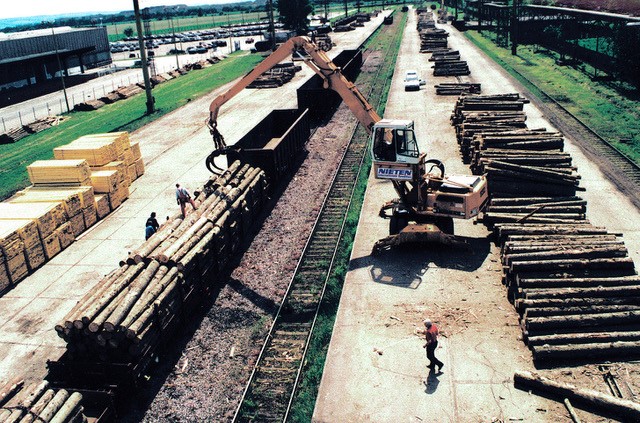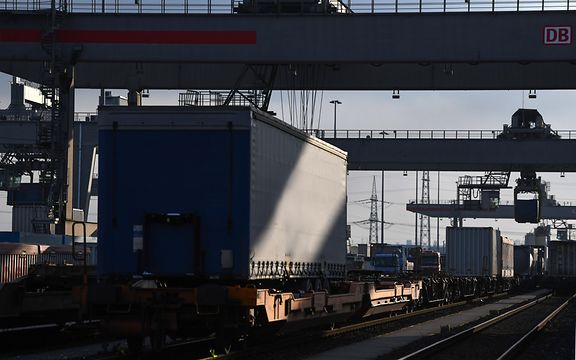100 years of timber logistics expertise at DB Cargo
The base for today's expertise in timber transport was laid in 1924 with the founding of the forwarding company Nieten.
When Carl August Nieten and Albert Kretschmer founded "NIETEN GES.m.b.H. Internationale Holztransporte" (Nieten for better legibility) in 1924, they probably had no idea that they were giving the go-ahead for an impressive company history. Today, exactly 100 years later, the forwarding agency no longer exists under this name, but "lives on" as the heart of DB Cargo's timber sector.
At the beginning of the 1950s, Nieten initially returned to the market with sawn timber transports from what was then Yugoslavia and Austria, but over time the company significantly expanded its transport portfolio. Log transports from Romania and timber transports from Scandinavia were added. Without exception, Nieten handled all transports by rail and worked together with Deutsche Bahn and its predecessors for many decades.
From Nieten to DB Cargo Logistics
By 2004, 80 years after the company was founded, Nieten had made a name for itself as an independent timber logistics company under various names. However, the freight forwarder was struggling with the growing competition on the market and therefore decided in 2004 to contribute its expertise to Europe's largest rail logistics company: Deutsche Bahn. "NIETEN Fracht-Logistik" was merged into what was then Stinnes AG, after which DB's entire timber business was concentrated in DB Schenker NIETEN GmbH. In 2016, this was merged with DB Schenker Rail Automotive GmbH to form DB Cargo Logistics GmbH.
History and stories
Today, Nieten no longer exists as a timber forwarding company under its own name. Nevertheless, it is still very important to DB Cargo, which is why we are taking a look at the history and stories of the company to mark the 100th anniversary of its formation. We spoke to Elfriede Balas, Claus Aigner and Clemens Pflästerer, who all work in the Timber division, some of them even before it became part of DB.
Three questions for Elfriede Balas
How long have you been with the company?I started my training as a management assistant for freight forwarding and logistics services at Nieten in 1990 and have always remained loyal to the company and its successors. Today I work for DB Cargo Logistics in sales.
So you had spent the last 14 years at the company before Nieten was absorbed into the DB Group. What market significance did the forwarding company have back then?In the 1990s, Nieten was definitely the leading timber forwarding company in Europe. We didn't just limit ourselves to Germany and Austria, but also seized the opportunity to utilise the expanded market in Eastern Europe at the beginning of the 1990s. After the integration into the DB Group, international transport operations were expanded even further and we also delivered to Italy, France and Slovakia. Our "new mother" was able to build on Nieten's extensive experience, expertise and contacts. Nieten was already a timber forwarding company with a focus on rail transport, so the takeover was naturally a positive achievement from DB's point of view.
You must have experienced a number of changes in timber logistics during your career. What do you remember in particular?Of course, digitalisation has not bypassed us either. In my early days, we used to send our customers pre-prepared CIM consignment notes by postal service, which they then took to the station and ordered wagons for transport. After loading the wagon and often making handwritten additions, a carbon copy was then sent to us and we took care of the invoicing. Today, of course, this is much easier and more convenient with our digital systems.
Three questions for Claus Aigner
How long have you been with the company?I came to Freilassing in 2004 from another forwarding agency and started in the Operational Processing Order Management department. So I joined shortly after Nieten became part of DB. Today I'm a dispatcher at DB Cargo Logistics. But whether Nieten or DB Cargo Logistics – besides the changing names, one thing has remained the same: industry expertise and customer proximity!
In your opinion, how has the timber market changed in recent decades?Today, there is a greater variety of products that we transport by rail. In the past, it was mainly logs and sawn timber, but in the meantime many other products have been added – pellets, particle boards, cross-laminated timber for house construction, to name the most common. Timber is very versatile, and the product portfolio we transport is correspondingly diverse. At DB Cargo Logistics, we have both the expertise and the equipment to transport the various products in the interests of our customers.
And how has the working environment in the industry developed in parallel?
A lot has changed, especially in terms of speed and complexity. In the past, at most the business accountants sat in front of a computer screen, today we all work with two to three monitors on which we can control and monitor the transports almost in real time using various programmes and tools. Our areas of responsibility are also much more varied and specialised: there used to be management, sales, order processing and business accounts. Today, we also have a fleet of freight wagons that our wagon management organises independently.
Three questions for Clemens Pflästerer
How long have you been with the company?I joined DB Schenker NIETEN in 2008, during the global economic crisis, and now head up the Timber Sales and Operations Centre at DB Cargo Logistics.
You came within the first few years of the integration of the Nieten company into the DB Group. In your opinion, have the expectations associated with the takeover been realised?Definitely. The idea was to utilise synergy effects – customers, relationships and contacts from Nieten paired with Deutsche Bahn's expertise and its own equipment. The hopes that the two companies would complement each other well have been fulfilled, although a few hurricanes also "played into our hands" in my early days – due to the many tree damages throughout Europe, for example, we transported more than a million tonnes of maritime pine over almost four years, and we had a block train of timber on the rails from south of Bordeaux to Germany and Austria every day. The synergy effects certainly played a good role here.
How do you see the market position of DB Cargo Logistics today?Unlike many market players, we are not focussed on a small radius, but operate throughout Europe. We also offer additional benefits for our customers with various services, such as our timber ports and multimodal door-to-door logistics chains. We are one of the major European timber forwarders and want to further expand our position in the future.
1924 to 2024. 100 years of experience in timber logistics by rail combined with modern equipment and a wide range of services for the entire industry make DB Cargo your first port of call for all types of timber transport. Find out more about the portfolio here in the industry portrait.
Get in touch with our expert.
Clemens Pflästerer
Head of Sales and Operations Center Timber, DB Cargo Logistics







